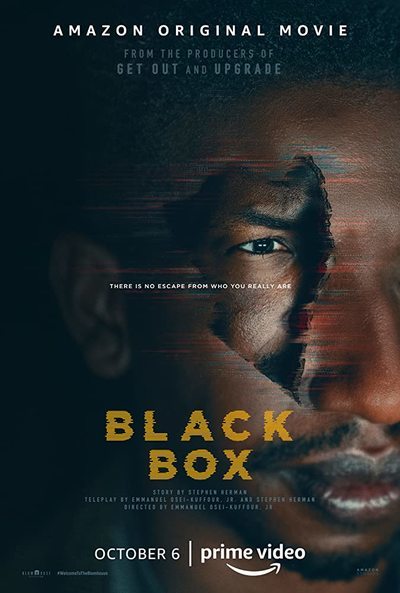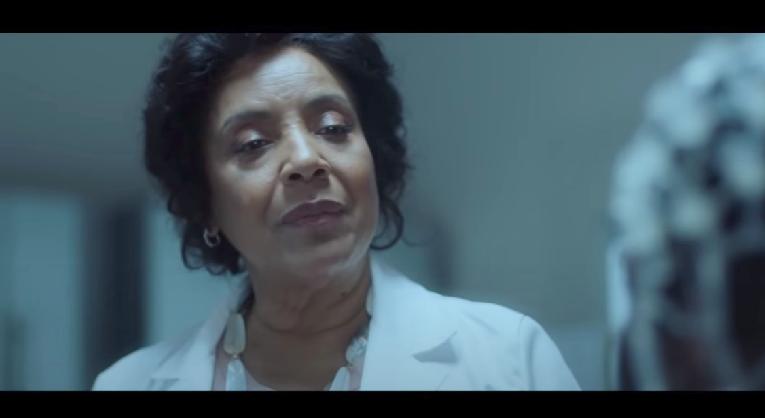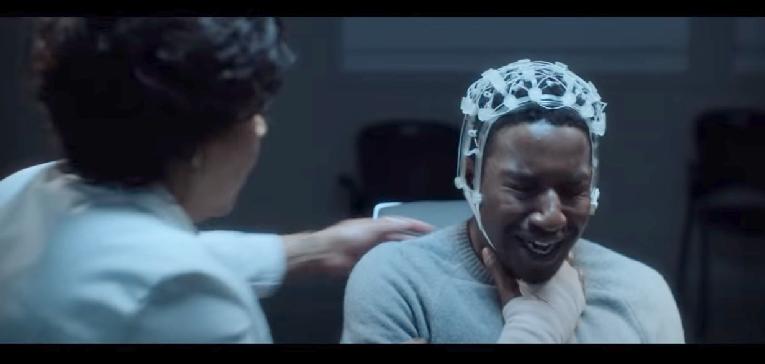*We caught up with filmmaker director Emmanuel Osei-Kuffour Jr. (Born With It) to dish about his directorial feature debut “Black Box,” which is part of Blumhouse Television and Amazon Studios horror/thriller movie anthology “Welcome to the Blumhouse.”
The first four of the eight-film in the series are now streaming on the platform, including The Lie, Evil Eye and Nocturne, and the titles arrive just in time for Halloween!
“Black Box” stars stars Mamoudou Athie (Jurassic World 3, The Circle) and veteran actress Phylicia Rashad and centers on a single father who loses his wife and his memory in a car accident, and he undergoes an agonizing experimental treatment that causes him to question who he really is.
Osei-Kuffour tells EUR in our exclusive interview that he hopes this tale starts a conversation about parenthood, and just how far you’ll go to protect your family. Check out our Q&A with the filmmaker below.

Phylicia Rashad is simply brilliant in this film. Was she your first choice to play the doctor?
Emmanuel: I never thought she would say yes. When you have a list of actors that you think could play this role, she was at the top of my list. It actually took Jay Ellis, who is one of the EPs on this project and really fought for me to get this job. He was the one that said, “You should write her a letter and see if she’d be interested in doing the film.” That’s how she came on board. I was really humbled that she loved the script and thought it was really smart. We had a really collaborative relationship. She was really humble and kind and just really sweet and just brought the best out of everybody on set.
What’s been most rewarding about this journey of taking the script to production to having it produced by Blumhouse and now it’s streaming on Amazon?
Emmanuel: I would say the thing that was most rewarding for me was just getting the chance to work with such a phenomenal cast. They say that directing is 50% casting. I think I got really lucky that all of my top choices for the most part were cast in this film. Everybody on this project was incredible. That’s the thing that kept me going every morning, every single day of the day to day shoot, and it really shows on screen.
As your debut feature, was there anything particularly challenging about bringing theses characters to life?
Emmanuel: Yeah. Yeah. This was a feature film. It was my first feature film. That was a challenge in and of itself, just getting used to the stamina needed to go 18 days. But also, it’s a feature film with a very limited amount of time. 18 days is a pretty limited amount of time when you think in terms of the time it takes to shoot a feature film. This film is, as you saw, it’s character driven, it’s elevated. On top of all this, it’s a psychological thriller/Sci-Fi. There’s a lot of moving parts. There’s a lot of character-driven moments that you really have to mind and, you have to do all this in a very, very, very limited amount of time.
I think that was the most challenging part. I spent about eight years living in Asia doing short films with an extremely micro budget, with very, very little time. Doing that and also doing the commercials for the past two years and working under time constraints has always forced me to prioritize shots that are absolutely necessary to get an emotionally impactful scene. That’s kind of what I leaned on every single day of the shoot when I had to cut shots or adjust on the fly. Yeah. I think the time was probably the most challenging.

Does this film add to the conversation about how medical advancements and technology is shifting and shaping the evolution of humankind?
Emmanuel: I’m not a futurist and to be honest, I’ve had that question come to me before. I was more interested in relationships and Nolan’s desperation to get better for his daughter, Lillian’s devotion to Nolan, and the reasons as to why she cares so much about his recovery. That was the focus for me. I wasn’t really trying to comment on the future of technology or even comment on the doctor-patient relationship and the breach of that. I wasn’t trying to comment on the doctor-patient relationship in any way, and I’m not trying to spoil the film as well.
I say all that to say that when I was trying to figure out how to bring the Black Box to life, I did want to use technology that felt grounded and felt like they could exist today. EEGs, which is the Net that Nolan uses in the film that Dr. Brooks puts on his head for every session, that’s a real life device. Obviously virtual reality is a big thing now. There’s technology out there. There’s research in various universities across the world. There’s a lot of research being done to transform brainwaves into images and into video. There’s technology that literally exists right now that can read your brainwaves and project an image or a video of what you’re thinking at that moment. If that technology exists right now, I don’t think it’s far-fetched to imagine that the technology of the Black Box could exist some time in the future.
If you could use a Black Box to communicate with a dead loved one, would you?
Emmanuel: I think that when you let go of people, there’s the psychological closure that happens and you never have closure.
What’s at the heartbeat of the Black Box story? What are some of the social themes embedded in this narrative?
Emmanuel: There’s a few things. Ultimately, this is a story about memory and identity. It’s about memory and identity in the aftermath of tragedy and how memories can get distorted or identity can get distorted and so forth. It’s also about the parent-child relationship on many levels. As people see the film, they’ll realize the bond between Nolan and his daughter, but also the bond between other people, all the parent-child relationships if you’ve seen the film. Again, I don’t want to spoil. I think the heart of this film is really a story of a deeply flawed man that gets a second chance to be a better father and is pushed to be that person as a result of his child.
That’s the theme that really spoke to me when I was thinking about how to rewrite this story. It’s something personal to me, and it’s something that I’ve seen happen to friends and loved ones in my own life. There’s something magical that happens when you have a child and suddenly, you’re pushed to be the best version of yourself. It’s ultimately about being a good parent and the sacrifices that you’ll make for your child.

The actor that played the Backwards Man, Troy James, were visual effects or any special costume design required to film him, or was his flexibility all natural?
Emmanuel: No, all practical. He’s all practical. One of the EPs, Lisa Bruce, she’s an incredible EP. She’s fundamental in the development of the script and just the journey of this whole system. She found Troy on America’s Got Talent. He did a lot of things that I wrote in the script naturally. He’s incredible to work with and a really sweet, sweet, loving guy.
Lastly, what do you hope viewers are left thinking or talking about after they watch Black Box?
Emmanuel: The sacrifices that you make for your child. I hope it starts a conversation about parenthood. It just shows how far you’ll go to protect your family. It’s specifically the sacrifices you’ll make to make life better for your child.
We Publish News 24/7. Don’t Miss A Story. Click HERE to SUBSCRIBE to Our Newsletter Now!





